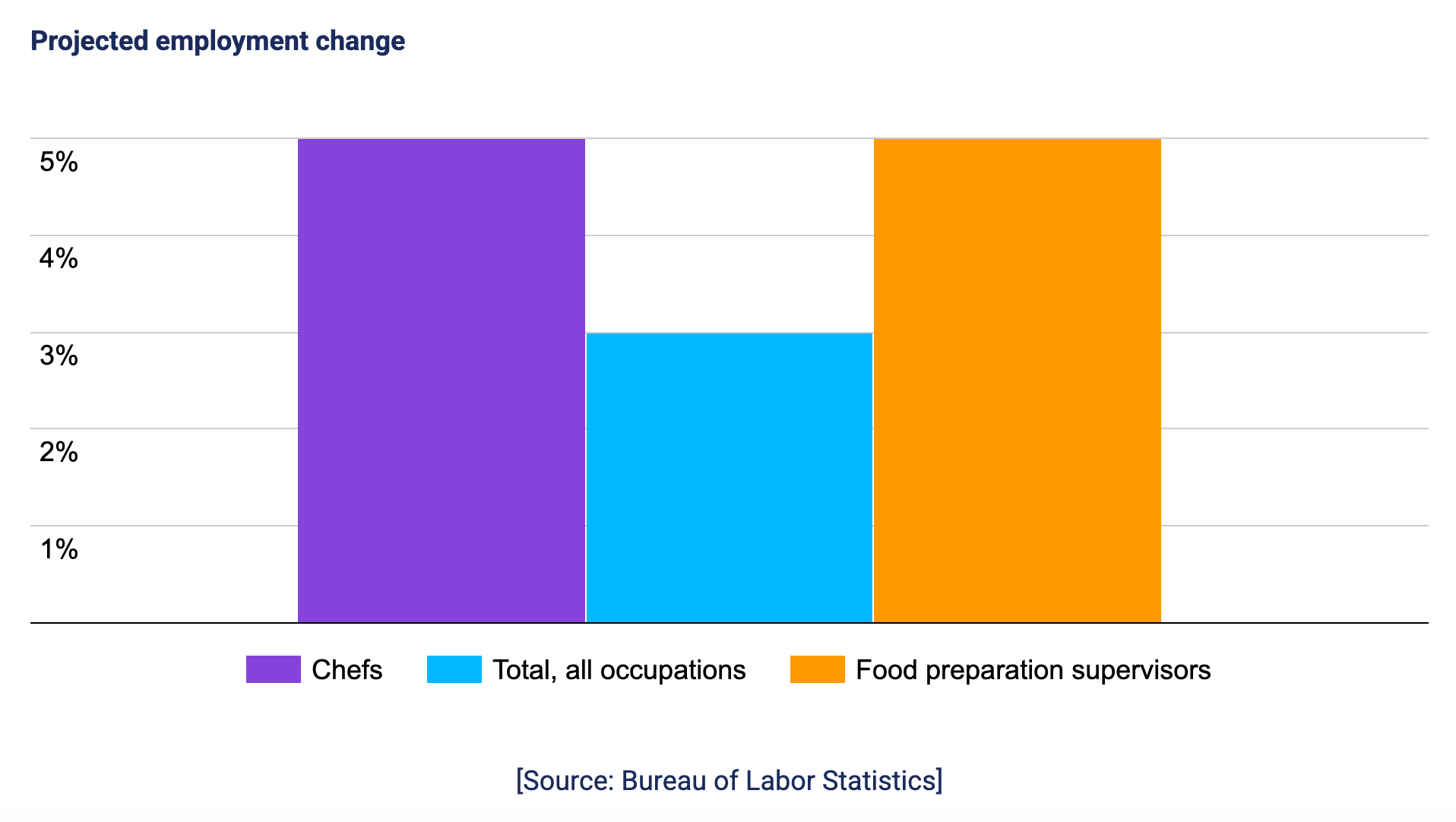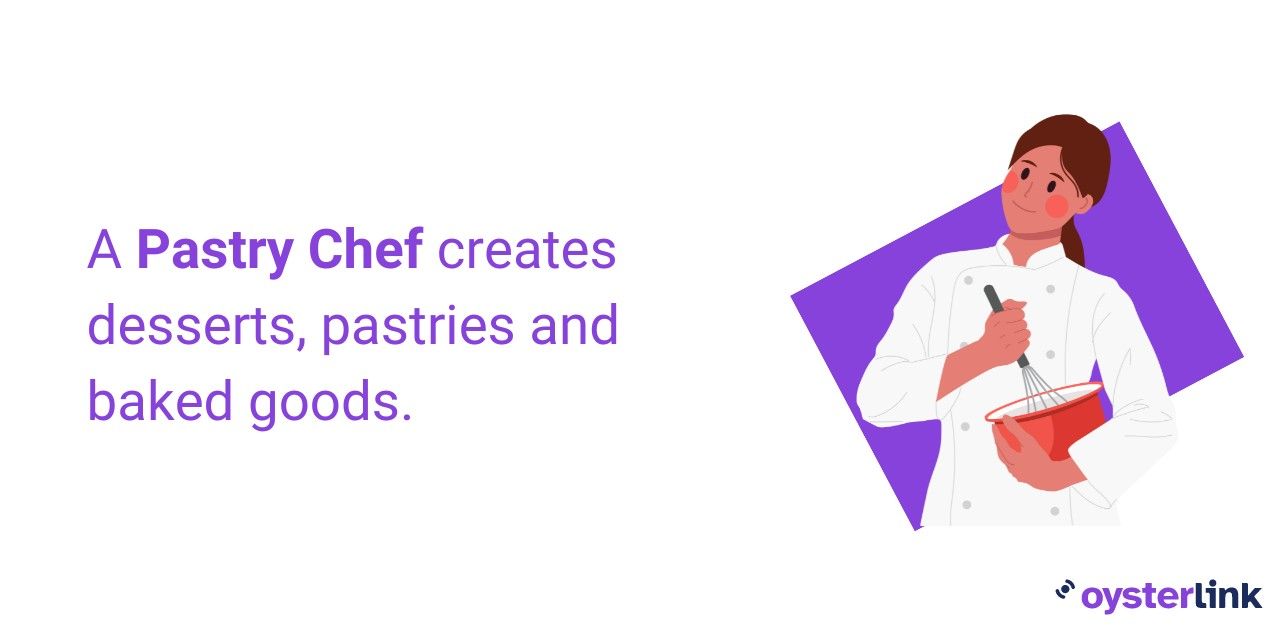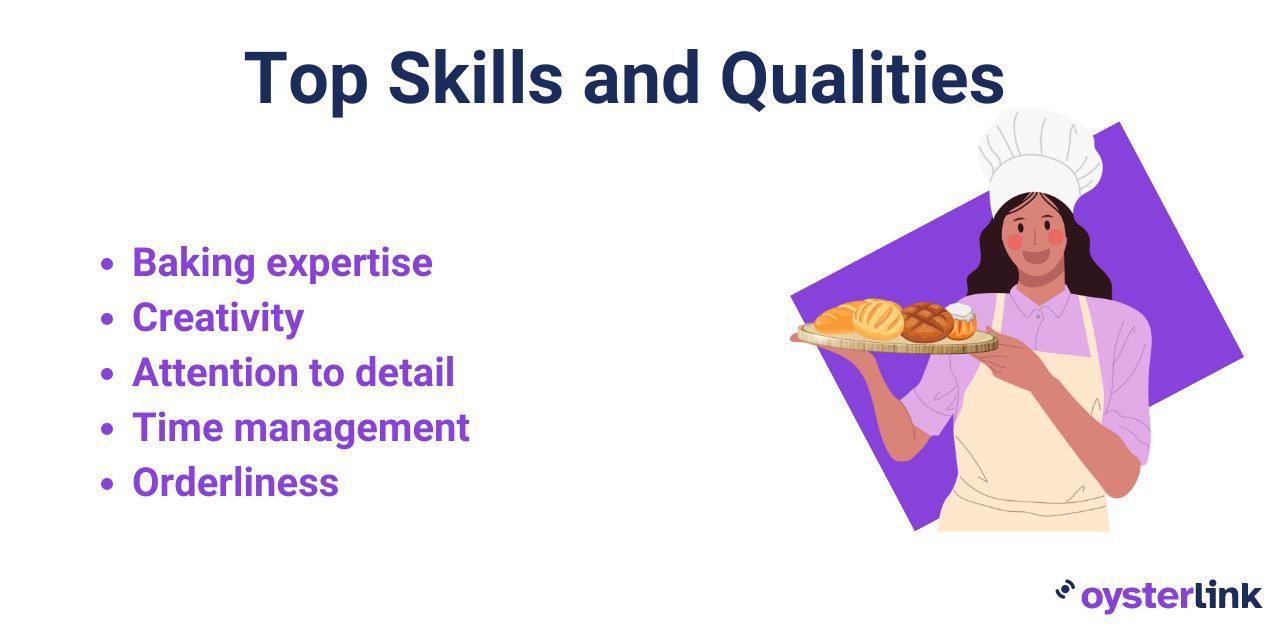Guide to a Pastry Chef Career
The Bureau of Labor Statistics projects a 5% growth in employment for those under the Chefs and Head Cooks category, which includes Pastry Chefs.
That said, current and aspiring Pastry Chefs can expect increased job opportunities and stable employment.

To guide you through this creative culinary role, this overview provides key information such as education and training requirements, essential skills, potential earnings and career advancement opportunities.
What Is a Pastry Chef?
A Pastry Chef (alternatively called a Patissier) creates desserts, pastries and baked goods.

What Does a Pastry Chef Do?
A Pastry Chef's responsibilities extend beyond creating desserts, pastries and bread. They also develop recipes, manage ingredients and supplies and follow measures to ensure food safety.
Pastry Chef Duties and Responsibilities
While the duties and responsibilities of Pastry Chefs vary depending on their rank in the kitchen and workplace, the most common ones are:
- Developing new recipes and adjusting existing ones according to customers' needs or preferences
- Planning pastry and dessert menus that fit the theme of the establishment
- Overseeing the production of goods
- Supervising and training the establishment's pastry-making staff
- Managing inventory of baking ingredients and supplies
- Implementing strict food safety and sanitation standards
For a more comprehensive list of Pastry Chefs' duties and responsibilities, visit our job description page.
Top 5 Skills and Qualities of Successful Pastry Chefs
To succeed in such a creative culinary career, Pastry Chefs must acquire and develop the following qualities and skills.

1. Baking expertise
A Pastry Chef needs to be proficient in various techniques involved in making baked goods and desserts. This includes caramelizing sugar, expertly mixing batter, decorating cakes and more. They must know how to execute both simple and complex recipes to produce high-quality menu items.
2. Creativity
This skill goes hand in hand with baking expertise. A successful Pastry Chef can plan and create visually appealing desserts and baked goods that would entice customers. Additionally, Pastry Chefs with great creative skills are more likely to come up with unique products by combining different flavors and textures.
3. Attention to detail
Given how baking is a meticulous process, Pastry Chefs need to pay close attention to every detail. From the measurement of ingredients to the elaborate decoration of cakes and pastries, they follow recipes precisely in order to ensure consistency in every product.
4. Time management
Similar to most Chef positions, Pastry Chefs must be able to meet tight deadlines without compromising taste or quality. This involves effectively handling multiple tasks and planning schedules to ensure that desserts and baked goods are produced on time.
5. Orderliness
Every successful Pastry Chef knows that a clean and organized kitchen is key to food safety and smooth back-of-house operations. That said, a Pastry Chef must have clear processes in place for sanitation, storage, labeling and inventory - all of which are essential in maintaining the safety and freshness of baked goods.
How To Become a Pastry Chef
Following these steps can help you better prepare for a Pastry Chef career.
Education & Training for Pastry Chefs
Attending a culinary school is generally not mandatory to become a Pastry Chef. However, it does provide practical experience and important skills such as food safety guidelines, recipe cost calculation and basic pastry techniques — all of which can give you a headstart.
If you're considering enrolling in a culinary school, here are some recommended institutions to get a bachelor's or associate's degree:
On the other hand, Pastry Chefs looking to improve their CV or resume through various Chef certifications and accreditations, such as:
Pastry Chef Salary and Earnings Potential
On average, Pastry Chefs in the U.S. earn an annual base salary of $54,995. Their salaries tend to differ according to the cost of living, demand for Pastry Chefs and the local economy.
Other Career Opportunities Within Pastry Arts
Pastry Chefs can also specialize in a variety of areas. Here are other careers to consider within the field of pastry arts:
- Viennoisier: A Viennoisier specializes in Viennoiseries, a bread made from laminated dough.
- Boulanger: A Boulanger creates a variety of French-style bread.
- Chocolatier: A Chocolatier crafts various desserts made from chocolate.
- Confiseur: A Confiseur or Confectioner work with sweets such as pralines, toffees and nougats.
- Cake Designer: A Cake Designer focuses on decorative cakes.
What Is the Work Environment for a Pastry Chef?
A Pastry Chef's work is physically demanding, requiring long hours of standing and lifting heavy bags of ingredients or equipment.
Pastry Chefs also often have to deal with high stress levels, especially during peak service times.
They work in different settings, such as restaurants, hotels, resorts, bakeries, catering companies and cruise ships. In each of these settings, maintaining a clean and organized kitchen is important for food safety.
Unlike other Chefs, Pastry Chefs often work in cooler environments, which are necessary for delicate ingredients like chocolates, laminated doughs and pastry creams.
Pastry Chef Career: Pros and Cons
To help you make an informed decision, we are sharing the most common pros and cons of this role.
Pros:
- Creative freedom: As a Pastry Chef, you may have more room for creativity in order to produce unique and aesthetically pleasing desserts.
- Variety: Working as a Pastry Chef allows you to immerse in different pastry and culinary styles, especially if you work in an establishment with a more varied menu.
- Career advancement: You have the chance to be promoted to higher-level roles like Executive Pastry Chef. Alternatively, you could eventually open your own baking business.
Cons:
- Long working hours: This job typically involves working for more than 40 hours per week and during weekends and holidays.
- Physically demanding: You'll be on your feet for hours, perform repetitive tasks and may frequently need to lift heavy objects.
- Meticulous processes and tight deadlines: Not only do you need to follow recipes precisely to ensure consistently excellent baked goods and desserts, but you also have to do these amid tight deadlines.